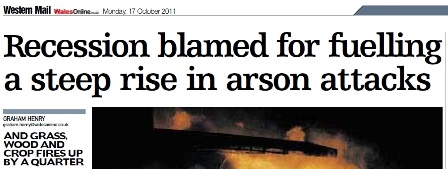Place burning down? Blame the recession
The Western Mail reports today that the recession is responsible for fuelling a steep rise in arson attacks. We all know that economic problems are currently responsible for everything that goes wrong, but is this conclusion justifiable?
Statistics issued on 13 October show that the total number of fires attended in Wales in 2010-11 was 20,661, compared to 19.131 in 2009-10. The fire and rescue services record as deliberate any fires that are known to be started deliberately, or if that is suspected, or if the cause is recorded as “doubtful “ by fire and rescue services.
In 2009-10, the number of such deliberate fires was 12,902. In 2010-11 it rose to 14,284 – an increase of 10.7 per cent. So one might indeed suspect that cash-strapped owners are setting light to their properties to escape their debts and claim the insurance.

Except that the 2010-11 statistics make it clear that all the increase in fires this year was in secondary fires – those that occur outdoors, not in chimneys, not involving casualties or rescues, and attended by four or fewer appliances. There was a 6 per cent decrease in primary fires.
Most of the secondary fires appear to have involved grassland. The Western Mail says (though this figure does not appear in the official statistics) that there were nearly 7,000 grassland, woodland and crop fires in Wales in the past year, an increase of more than a quarter on the previous year, and that 85 per cent of them were started deliberately. If so, these fires account for all of the increase recorded – and deliberately-started fires not involving grassland, woodland and crops actually declined in 2010-11, as the statistical commentary suggests.
Does a recession make more people set light to grassland? It’s possible, I suppose, that the devil makes work for idle hands to do. But the statistics do not appear to bear the interpretation put on them by Matt Jones, fire crime official for South Wales Fire and Rescue Service, who told the Western Mail that the recession was having a “huge” impact on the number of arsonists, with more buildings being left empty and in disrepair.
The figures actually appear to show there were fewer building fires in 2010-11 than in 2009-10. Indeed, that is Mr Jones’ own experience in South Wales, where the figures are down. But he appears to believe things are different elsewhere in the Principality.
Besides, if the recession were responsible, fire-raising would have started when we were in recession. We’re out of it now, if barely. So I find this interpretation of Wales’ fire statistics unconvincing.



